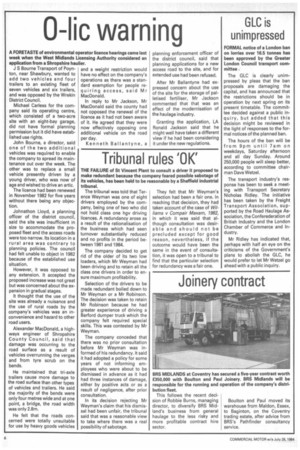Tribunal rules 'OK'
Page 8

If you've noticed an error in this article please click here to report it so we can fix it.
THE FAILURE of St Vincent Plant to consult a driver it proposed to make redundant because the company feared possible sabotage of its vehicles, has been held to be reasonable by a Sheffield industrial tribunal.
The tribunal was told that Terence Weyman was one of eight drivers employed by the company, being one of two who did not hold class one hgv driving licences. A redundancy arose as a result of the rationalisation of the business which had seen turnover substantially reduced and no profits in the period between 1981 and 1984.
The company decided to get rid of the older of its two low loaders, which Mr Weyman had been driving and to retain all the class one drivers in order to en sure maximum profitability.
Selection of the drivers to be made redundant boiled down to Mr Weyman or a Mr Robinson. The decision was taken to retain Mr Robinson because he had greater experience of driving a Bar-ford dumper truck which the company felt required special skills. This was contested by Mr Weyman.
The company conceded that there was no prior consultation before Mr Weyman was informed of his redundancy. It said it had adopted a policy for some years of not informing employees who were about to be dismissed in advance as it had had three instances of damage, either by positive acts or as a result of negligence, after prior consultation.
In its decision rejecting Mr Weyman's claim that his dismissal had been unfair, the tribunal said that was a reasonable view to take where there was a real possibility of sabotage.
They felt that Mr Weyman's selection had been a fair one. in reaching that decision, they had taken account of the case of Williams v Compair Maxam, 1982, in which it was said that although consultation was desirable and should not be precluded except for good reason, nevertheless, if the outcome would have been the same in the event of consultation, it was open to a tribunal to find that the particular selection for redundancy was a fair one.




























































































